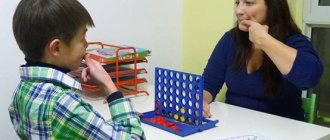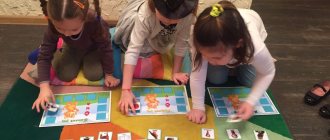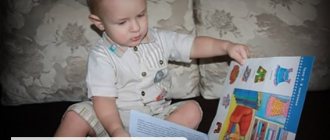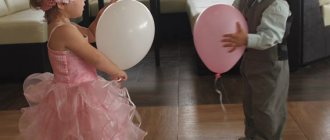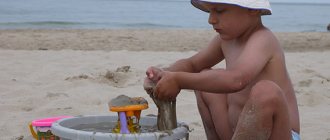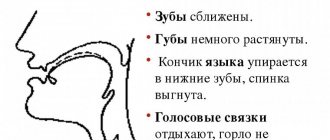- home
- Speech development
Speech development is the most important process for every child. Its features determine not only the ability to express one’s thoughts, but also the ability to communicate effectively with others and influence the success of learning at school. This is why it is so important to conduct speech therapy sessions with children five to six years old. It’s good if parents not only use the help of specialists, but can also independently organize classes with their child at home.
Typical speech disorders in children 5-6 years old
Most older preschoolers have difficulties with:
- mastering sonorous and hissing sounds;
- sound analysis of words;
- development of narrative speech;
- writing a story and descriptions.
Of course, such problems can be minor, only slightly different from the age norm, or serious, up to and including general speech underdevelopment (GSD). It is necessary to contact a speech therapist in any case, but the supportive work of parents at home is also very important.
It is worth noting that regular speech therapy exercises and classes for children 5-6 years old are useful for every child at home, because they help to master literacy faster.
Rules for speech therapy classes at home
The success of home lessons depends not only on the availability of the necessary aids and a work plan agreed upon with the speech therapist. The organization of classes itself is very important. Here are a few simple rules that will help you achieve excellent results:
- All speech therapy exercises for children should be carried out regularly, but a little at a time. You shouldn’t try to do articulation gymnastics, play speech games, or fill out a workbook right away. It is better to devote a few minutes to each type of exercise, rather than having a whole “speech therapy day.”
- Do not force them to complete tasks under pressure; educational activities for children should resemble a game. Come up with a simple plot (for example, a journey into the universe of sounds), prepare small prizes (stickers, paper stars), and arrange physical exercises.
- Praise and support the little student if he makes even the slightest progress. Focus on achievements, even small ones, gradually progress will become more and more obvious.
- Find good workbooks for home practice. They should not only be professional in content, but also bright, colorful, and exciting. It is ideal if the tasks have interactive elements (the opportunity to add something, draw something). Such material makes it possible to interest a preschooler and clearly shows him the “path traveled” and success.
- Don't expect instant results, be patient and gentle perseverance. The process of setting, consolidating, and differentiating sounds is complex; it takes months even for experienced speech therapists. Follow the plan and the results will gradually appear.
Speech therapy exercises for practicing at home
All speech therapy exercises can be divided into three large blocks, each of which needs to be given attention and carried out regularly:
Development of phonemic hearing
The ability to distinguish sounds by ear seems natural, but if you ask your preschooler to spell a word, you will see gaps.
For children 5-6 years old, there are a large number of special games and exercises that help develop phonemic hearing. These include:
- selection of words starting or ending with a given sound;
- counting sounds in a word, determining the syllable structure;
- drawing up a sound diagram of a word;
- inventing rhymes and short poems;
- pronouncing speeches and tongue twisters.
Thoughtful speech therapy classes for children 5-6 years old make it possible to make all the sounds of their native language obedient and easy.
Finger gymnastics
Fine motor skills of the hands help speech activity, so older preschoolers must do it without fail.
Of course, for children 5-6 years old, the exercises should be complex, with a script, in verse. It is useful to select sets of exercises for both hands at the same time, synchronous. Don't forget to use "helpers":
- small massagers (rubber balls, rollers, cones);
- scissors for cutting;
- plasticine;
- origami paper.
Also remember that all types of needlework, construction, and any creativity are great ways to improve fine motor skills outside of individual lessons.
Articulation gymnastics
Special language exercises must be performed every day if there are any problems with pronunciation. For home exercises, it is best to choose a set of exercises with a poetic description and pictures.
Do a tongue warm-up every day, always in front of a mirror (this allows the baby to observe the process himself, assessing its success). If you have problems with one or two sounds, then articulatory gymnastics should be selected for them. These can be found in thematic workbooks on speech therapy.
What is included in the concept of “speech development”?
A child’s speech skills cannot develop on their own. They become a logical continuation of his overall development - both physical and mental. The vestibular apparatus, fine motor skills, thinking, memory, sense of rhythm, proper breathing, active speech environment - all these are indispensable companions for the timely and correct development of speech in a preschooler.
Often, a lag in speech development is observed in children who are simply not given enough attention in the family: they are spoken and played with little, they feel lonely, incompetent, and become withdrawn and embittered. After all, their peers who have no problems with speaking make fun of them for their speech “mash”. And this will lead to inevitable socialization problems and complexes in the future.
Therefore, for the full development of a child’s speech, it is important for him to provide all the prerequisites:
- a prosperous environment (a nervous environment, frequent stress will certainly slow down the baby’s speech);
- parental love, care, support - in such an atmosphere the baby will feel calm and protected, and this is one of the main conditions for his harmonious development in general (speech development in the first place);
- active speech environment (it is desirable that native speakers use it correctly, without defects and errors, enrich it with intonations and emotions);
- development of the articulatory apparatus (voice, breathing, lips, tongue, cheeks, jaws);
- development of motor skills, especially fine motor skills - it is directly related to the speech centers of the brain;
- proper development of hearing, including phonemic;
- developing a sense of rhythm - this will help the child to correctly organize his speech in the future;
- enrichment of vocabulary - it must happen constantly, this is how the baby’s speech will be alive, constantly developing.
Yes, there are quite a few items on this list, and the importance of each cannot be underestimated. After all, the child develops comprehensively - at the same time improving walking skills, coordination, thinking, dexterity, and flexibility. At the same time, he is constantly growing, his teeth are changing, and many other processes are happening. And developing speech should fit harmoniously into this “story.” The only way.
Speech therapy tasks
Starting with the letter R
One of the most difficult sounds to master is R. Many preschoolers learn to roar loudly by the very end of kindergarten. If the production of the sound P is already behind you, then special exercises will help speed up its automation:
1. “Like a little motor”
We ask the child to pronounce the sound R in the word for a long time, drawlingly (like a motor growls).
2. “Where is R hiding?” (in pictures and words)
Offer to choose pictures with images of objects with a given sound or clap your hands if he hears such a word.
3. “How can you growl?”
Show your child pictures of objects that have the sound r in their names. Offer to read and color the picture.
4. “Sounding tracks”
Together with your child, come up with several chants made up of several syllables:
Ra-ra-ra - they ran away from the yard.
Ro-ro-ro - and they found a bucket.
Ru-ru-ru - we came up with a game.
5. “Substitute a syllable”
The adult offers the child words that end or begin with a syllable with P (ra, ro, ry), the child must choose the correct option and pronounce it correctly.
6. “Look and name”
An adult asks the child to read words with the letter r from the pictures. The word must be said as many times as there are stars next to each picture.
7. “Poems, tongue twisters, riddles”
Learn with your child several poems and riddles in which words with R appear.
The necessary tasks for speech development can be found in the Workbook for the sound R, compiled by Kostyuk A.V.
Download, print the tasks in pictures and study at home:
Speech therapy tasks for the letter P
Starting with the letter L
The hard sound L is also often difficult for children 5-6 years old. If the baby has already learned to pronounce it alone, in isolation, then it’s time to start working on automation in speech. The following exercises are suitable for this:
1. “Say it nicely”
Offer your child several images of words starting with L. Ask him to pronounce the words beautifully, emphasizing the desired sound with his voice.
2. “Toys for Larisa”
Ask your child to collect gifts for the Larisa doll. Tell her that she only likes things that begin with L. For this exercise, you need to select small objects or pictures in advance; all words should not begin only with L.
3. “One-many”
Invite your child to name words with L in the singular and plural. In the workbook for the sound L (author Kostyuk A.V.) there is a whole table with pictures for this exercise (lesson 20).
4. “Find the Sound”
Invite your child to draw up a diagram of the word and mark the place L on it. If it is still difficult for your child to independently determine the number of sounds, then first you can do several similar exercises from the workbook.
5. “Tongue twisters and nursery rhymes”
Use nursery rhymes, tongue twisters and poems with words that contain L.
Download and print tasks in pictures starting with the letter L:
Speech therapy tasks for the letter L
Speech therapy
Here we will talk about aspects directly related to the development of speech organs. In order to clearly and correctly pronounce sounds, the baby must have mobile and developed muscles of the lips, tongue (including the hyoid frenulum), lower jaw, cheeks, and developed speech exhalation power.
It is important to teach a child to give certain positions to his lips and tongue and to quickly change them during speaking. The jaws and cheeks are actively involved in the work of correct sound production. If they are constricted or not developed, pure and clear sounds cannot be produced. And if breathing is poorly controlled, it will be difficult for the child to say anything clearly. As an option, he will begin to speak while inhaling, choking and “eating” the words.
A set of articulation (speech therapy) gymnastics exercises will help your child develop these skills. This is discussed in more detail in our article on this topic.
Advice
At the age of 2–3 years, have your child examined by a speech therapist, neurologist, or pediatrician. If physiological defects in the organs of the articulatory apparatus or psychological disorders are identified that prevent the baby from speaking correctly (or speaking at all), it will be necessary to take measures to correct the situation.
For example, difficulties with pronunciation can be caused by:
- short hyoid frenulum;
- short or too large tongue;
- malocclusion;
- large lips;
- defects of the palate (“cleft palate”, “cleft lip”);
- increased (or vice versa, decreased) tone of the muscles of the face, neck, tongue, lips;
- severe fear, psychological trauma;
- lag in general development.
In such cases, speech therapy gymnastics alone will not save the situation, so specialists prescribe corrective therapy (massage, sessions with a psychologist, and in severe cases, surgery).

